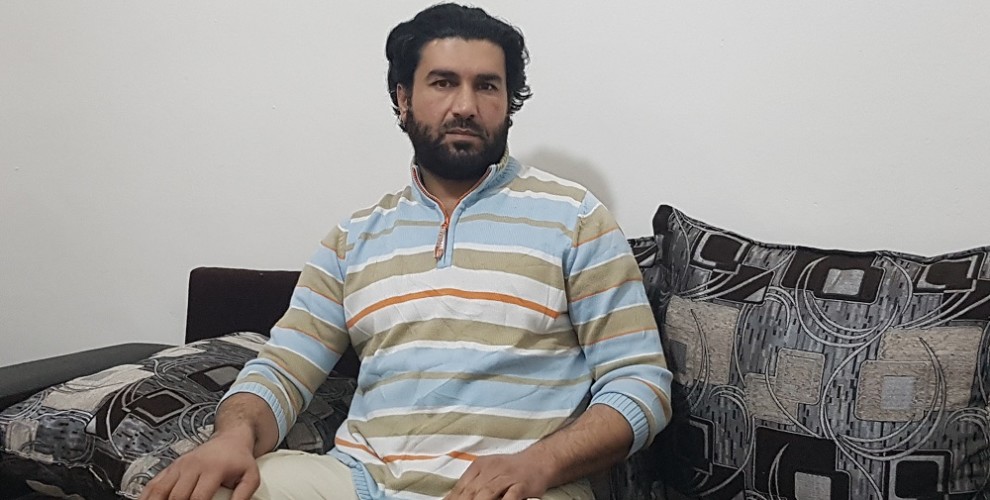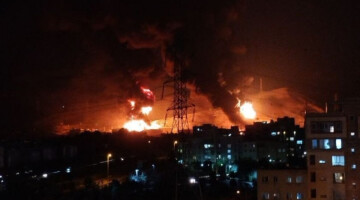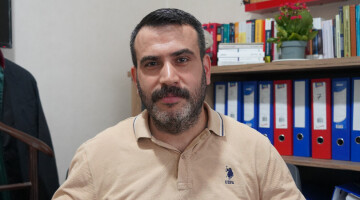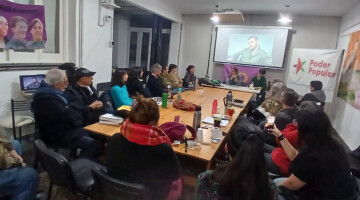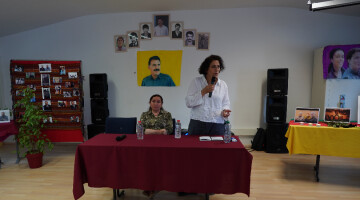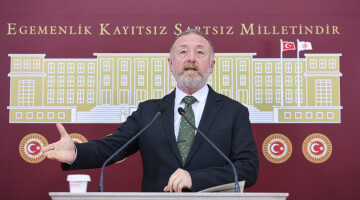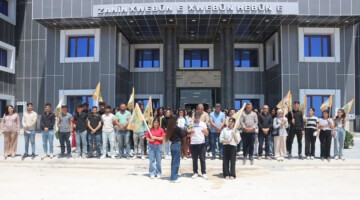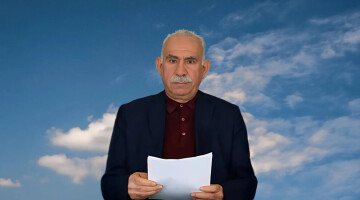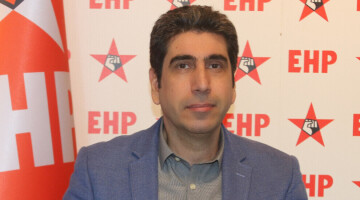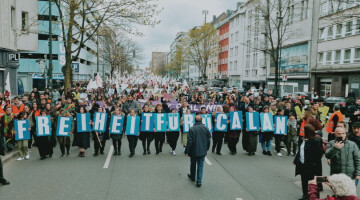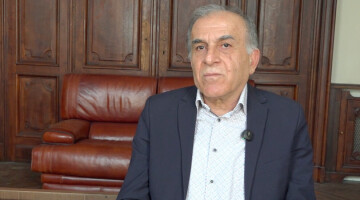Fadıl Muhammed Selim has been involved in the insurgencies and activities in Syria since the first day on March 14, 2011. He was among the founding members of SNC (Syrian National Council) and in the preparation committee for the first congress in Tunisia. After the congress, he became responsible for SNC's press relations committee. He worked as the Revolution Council High Assembly Official Spokesperson. After Robert Ford’s comments in 2013 where he said “You are not ready for revolution, you are not the force to govern Syria”, he left and returned home to Shaddadi. He was captured by ISIS. When Shaddadi was liberated by the SDF, he was taken to Mergede by ISIS. Later, he sent a message to YPG through his wife that he would escape and seek refuge, and four months ago he did escape ISIS to seek refuge with the YPG.
Fadıl Muhammed Selim spoke to ANF on the founding of SNC and the anti-PYD and anti-YPG impositions of the so-called Kurdish bloc members Fuat Aliko, İbrahim Biro, A. Hekim Beşar and others who are in SNC and still speak in the name of ENKS (Kurdish National Council in Syria). He said a coordination was set up among those acting in the name of the Kurds and Turkey’s administrators in provinces with a border to Rojava, and that coordination met regularly and made decisions. Selim relayed the duties assumed by these people and groups in the Serêkaniyê attacks in great detail.
When did you join the insurgency in Syria, when did you exit Syria?
I’m a lawyer. I was working in Hesekê Bars Union. I took my place within revolutionary organizations after the Revolution began. I organized the first demonstration in Hesekê against the Baath regime. I was caught by the intelligence agents and subjected to intense torture, then I was arrested.
I was assigned as Hesekê province representative for the Revolution Council High Assembly. With Mişel Temo’s murder, I started to fear for my life. I left the Hesekê province, and then exited Syria altogether.
Where did you go after you exited?
I first went to Jordan. My duties in the Revolution Council High Assembly increased. I was made Revolution Council High Assembly Official Spokesperson. We stayed in Jordan for some 9 months. The Revolution Assembly administration was in Yemen. Representatives like Mûtîî Bitêq Tehsîn Seyid, Mihemed Omer and Dr. Elî Amir in particular came there. A revolutionary organization against the Jordanian government was also founded. For these, the Jordanian intelligence were telling us to leave the country. The assembly members were financially very well off. When we needed money, a man called Mihemed Xazî handled it without a hitch.
After the name changed to Syrian National Council (SNC) and Burhan Ğelyûn became president, the US, France, Qatar and Saudi Arabia also supported it.
The Syrian National Council was made up of several political blocs and groups. The largest was the Turkey-backed Muslim Brotherhood. There were also many Kurds.
How were you received in Turkey?
We went to Istanbul after we left Jordan. Because Turkey was supporting us. We were met with great interest from the Muslim Brotherhood. Muslim Brotherhood themselves received the biggest support from the Turkish government. Back then Milhem Dirûbî was the spokesperson for the Muslim Brotherhood. Most of the Muslim Brotherhood members who handled us were from Hama. They hosted us and took care of our housing needs and other requirements. They were making us permanent in Turkey.
Why did you hold your first congress in Tunisia?
After the council was formed, we turned towards Tunisia. We went to Tunisia to hold our congress. The decision to hold it there was made after Tunisia sent us a message that they wanted us to have the congress there. With that, they were trying to give the message that they had gotten rid of the Zêynel Abîdîn government and that they were free.
We held the first congress of the Syrian National Council in Tunisia. This congress was held under the lead of the US, Turkey and Tunisia. All groups in the Council gathered there and held lengthy, large scale discussions. Out of the Arab countries, Qatar, Saudi Arabia and Tunisia supported us, while the list went on for others like the US, France, the UK and Norway.
How was Turkey’s approach towards SNC?
We saw Turkey as a country that supported the Syrian Revolution. We received support from within Turkey as well. Because Turkey supported the Muslim Brotherhood, who had the largest representation in the Council. They had a large and important role in the Council. In this manner, there was good coordination between them and Turkey. Turkey had a strong role in the Syrian National Council. After the Council was founded and declared, members were announced. I was one of them. I was assigned to the press section.
How was Turkey’s approach towards Kurds?
Turkey always pointed to the border with the Kurds. They didn’t want the Kurds to build a will and have power in these regions. In all statements, they said the Kurds wanted to found a state, and Syria would be fragmented. Their fear was great. They were trying to follow the Kurds’ situation over Hesekê rather than Efrîn, Kobanê and Sheikh Maqsoud. There were games within games. As Turkey’s fears continued, on the suggestion of the Kurdish group in the Council, a safe zone was demanded. The safe zone would encompass the border line, and be 40 km deep. This safe zone would be banned for the regime aircrafts.
What was the stance of ENKS, which is part of SNC? What did they want?
Turkey was trying to fill the political void left by the regime with these groups. They didn’t want PYD to have influence there. They were trying to prevent that. They said they were the political and military representative of the Kurds. They said PYD was strong in the military sense and they pressured the Council workers. They said the Council members had to leave the country for this reason.
In the congress in Hesekê, some demands were developed by the Kurdish group. The Kurdish group demanded that the revolutionary organizations and SNC not make any appeals to PYD for necessities. Their fundamental demand was that PYD was disregarded and wasn’t considered the representatives of the people. To be able to stand against the PYD politically, they demanded great support for themselves. Because in the military sense, they had no power.
Because they had representatives in the Hesekê congress, this demand was submitted by the Kurdish group officially. They made these demands officially, in that they were the “representatives of Kurds”.
Even though their demands were the same, they continued in conflict due to the fragmented stance among them, until the ENKS was formed.
This is what they wanted from us: People like Ebdluhekîm Beşar, Îbrahîm Biro, Ebdulbasit Seyda, Fuat Aliko will be considered the representatives of Kurds, and everything will be discussed with them. No attention whatsoever will be given to the PYD. They will be supported financially in every way. They calculated that through such measures they would get 80% of the Kurdish vote in elections in cities like Qamishlo and Hesekê, and PYD would be at 20%. Their fundamental demand was to be seen and treated as the representative of the Kurds.
At the same time the Hesekê city congress was held, we were holding our general congress in Tunisia. We met as a small assembly of Arabs, Syriacs and Kurds. Later we had congresses in Urfa and Istanbul in Turkey. Other than those, we held another congress in Cairo once. The Kurdish group wasn’t in the congress held there. We held three general congresses in total. These people were there as the representatives of Kurds. Our general congresses were held in Turkey.
Where was the Hesekê congress held?
The first congress for the Hesekê province was held in Urfa. Representatives from the Kurdish bloc were present in this congress. At the time of the congress, there were problems between the FSA and the PYD over Serekaniyê. Most of the Kurdish bloc then wanted to support FSA and prevent support for PYD. They also wanted the US to pressure PYD and remove them from the region.
Why did Turkey think this congress in Urfa was so important? What was discussed in the congress?
All congresses were held on the request by the province representatives. Only the Hesekê province congress was different. Turkey placed great importance on this congress. Turkey had concerns over the Hesekê province, and their biggest concern was the YPG.
The parties present in the Hesekê province congress, the Syrian Tribes Assembly, had come together under Salim Mislet’s lead. Turkey and SNC gave full support to that congress. There were Kurdish and Arab representatives in the congress and they presented their proposals. The issues the Kurdish group raised in the congress showed clearly that they received their perspective from Turkey. The points this group and Turkey agreed on were no military or political support for the PYD and pressuring the PYD. That way their path would be clear, they would easily move in to Qamishlo or the regions where the regime retreated and carry out political activity. They saw themselves as the representatives of Kurds and claimed that the PYD hindered their political rights, and pressured and terrorized them.
And what was this group offering as a political and military force and a project in your congresses? Did they have a project, or the power?
In the second congress we held in Istanbul, this group called the Kurds’ group was present. They stated that they had formed an army. They said the army they formed fought against the PYD. They demanded support for this army that was fighting the PYD. There was significant support for their military groups.
Representatives of the Turkish state had a strong presence in these congresses. They made all their preparations before the congress. Demands of this group in the name of the Kurds were determined by the Turkish state. There was a great alliance among the Turkish state, the Muslim Brotherhood and this group. In all the congresses, the demands and proposals brought by these three groups were nearly identical.
The processes you speak of coincide with the Serêkaniyê attacks. What was the stance of Turkey and this “Kurdish group” towards the Serêkaniyê attacks?
During the fighting among YPG, FSA and Al-Nusra in Serêkaniyê, the Serêkaniyê border gate was wide open for the FSA and Al Nusra front. Ambulance, vehicles, logistical and ammunition support was provided by the Turkish state. They crossed over to Turkey by the border gate and acquired the ammunition they needed to fight the YPG. I was also at the Serêkaniyê border gate at the time, but I didn’t cross over to Turkey. I witnessed the aid given to the FSA with my own eyes. This aid was so the YPG wouldn’t liberate Serêkaniyê.
There were armed Kurdish groups who fought against the YPG in Serêkaniyê as well. These groups presented their demands to the Hesekê province assembly. The Kurdish group in the Council tried to accommodate demands by these these armed groups.
There were some famous names in these groups, like Fûad Elîko, Ebdulhekîm Beşar, Îbrahîm Biro and Ebdulhemîn Hecî Derwêş. These people answered directly to Barzani. They made the decisions for the Kurds in Turkey, namely Istanbul. They carried out a relentless slander policy against the PYD and they cultivated enmity.
Turkey’s border forces had a good coordination with this group. They held many meetings, but we couldn’t attend them. Many Kurds who weren’t in the Hesekê province and the national council received aid from the Turkish state. We weren’t involved with this, but everything was apparent when one looked from the outside.
Why did you leave SNC and return to Syria?
The US gave us diplomacy training. When the regime fell, we were to become the ambassadors for Syria in foreign countries. We received the training in Italy. When we were in training, the word was that the regime had one month left to go. After we completed the training successfully, we demanded from the US, the EU, Qatar and Saudi Arabia that the regime be removed. We told them we were capable of filling the void. Then US Ambassador Ford said the regime would not fall at that time. He said there was no alternative for the regime and its void wouldn’t be filled, so that wasn’t going to happen anytime soon. They told us to either stay as political refugees or to return to the country. They told us we were free to do as we chose. I then decided to return to Syria. I made suggestions for Amûdê, Dirbespiyê or Shaddadi. The FSA, Al-Nusra and ISIS held those areas at the time. Our friends in the so called Kurdish group advised me not to go to areas where PYD was present. I wanted to return to Amûdê but they told me PYD would either kill me or hand me over to the regime. They convinced me on this. ISIS took many areas up to Deir ez-Zor, including Shaddadi. As I was influenced by what they told me about the PYD, I desperately went to Shaddadi.
When I crossed, ISIS took me. They told me to either work with them or be shot. I worked with them. They made me work mostly on property law, because I’m a lawyer. There were 1200 backlogged cases. I went through those cases in one and a half years. Last year, when Shaddadi was liberated by the SDF and the YPG, I went alongside ISIS to the Mergede side. In the last months of last year, I arranged my escape, and I ran to seek refuge with the YPG.

